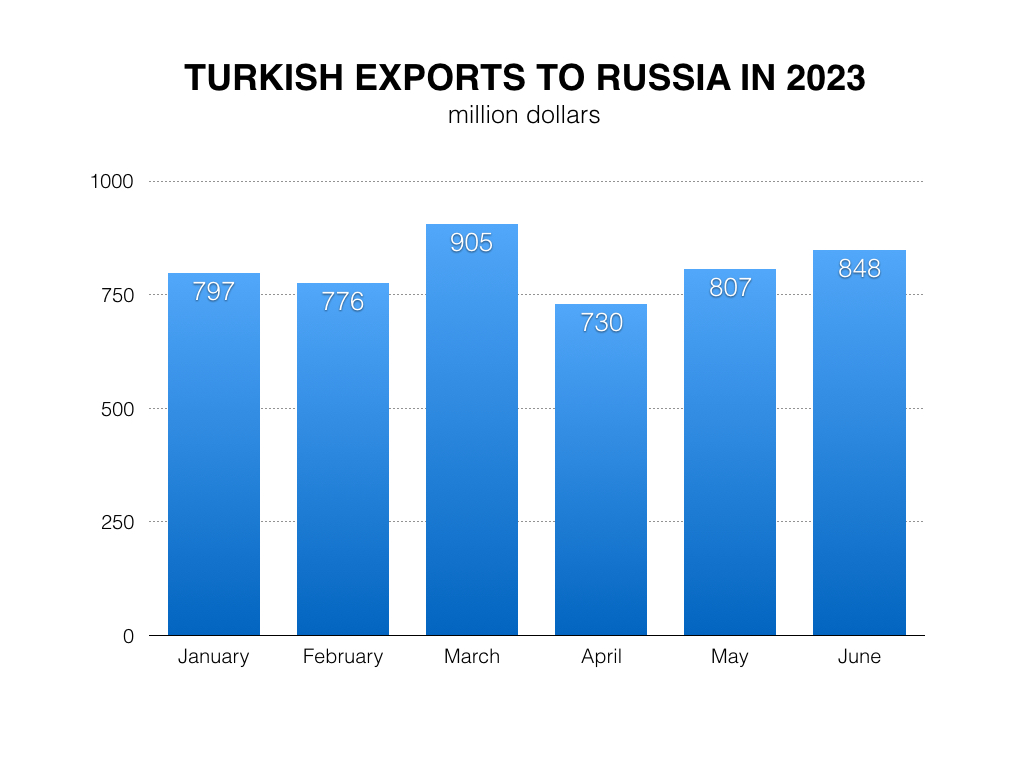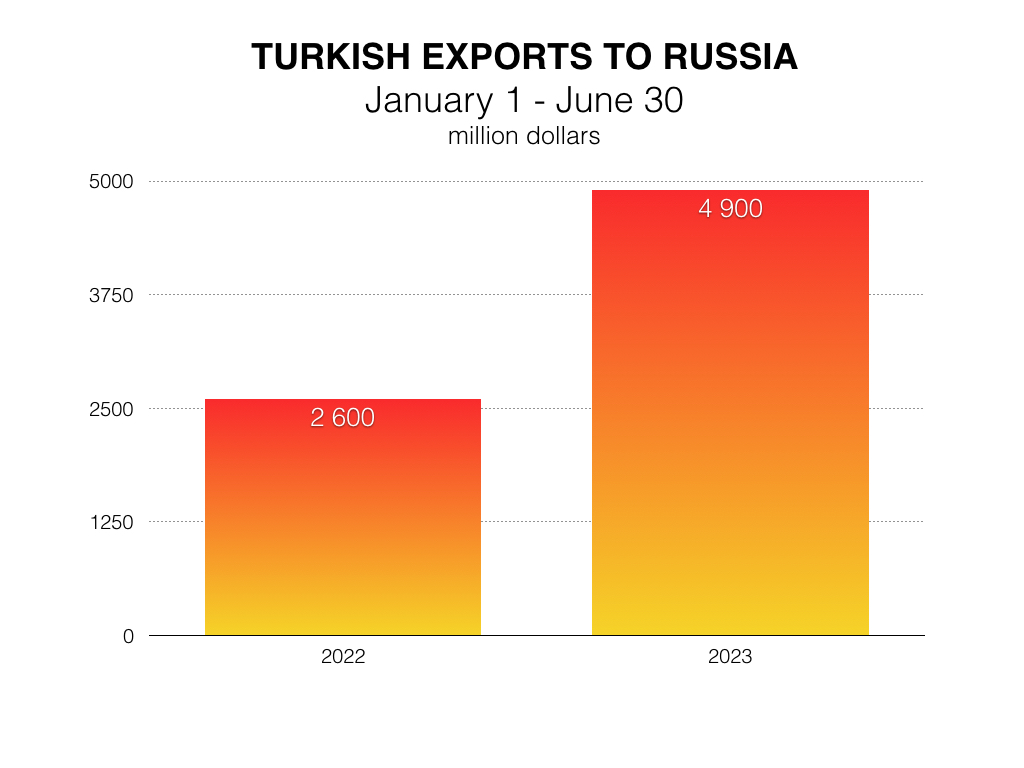Turkey’s exports decreased by 10.5 percent to $20.9 billion in June compared to the same month last year, according to official data released by the Turkish Ministry of Trade on Monday. Imports also reached their lowest level in the past 20 months in June.
However, trade with Russia followed a different trajectory compared to other countries. Turkey’s exports to Russia in June increased by 23.9 percent and have shown an 88.6 percent increase since the beginning of the year, compared to last year’s data.
In June of the previous year, Turkey’s exports to Russia amounted to $684.9 million. However, in June 2023, this figure surged to $848.4 million, reflecting a significant increase.
During the January 1 to June 30 period, Turkey’s exports to Russia witnessed remarkable growth. Last year’s exports, valued at $2.6 billion, more than doubled this year, reaching $4.9 billion.
 Despite a decline in imports, Russia has maintained its position as Turkey’s largest trading partner in terms of goods purchased. Between January and June, Turkey imported a total of $27.7 billion in goods from Russia. Russia accounts for a significant share of Turkey’s total imports, representing 13.4 percent. Following Russia closely is China, with $20.84 billion and a 12.1 percent share.
Despite a decline in imports, Russia has maintained its position as Turkey’s largest trading partner in terms of goods purchased. Between January and June, Turkey imported a total of $27.7 billion in goods from Russia. Russia accounts for a significant share of Turkey’s total imports, representing 13.4 percent. Following Russia closely is China, with $20.84 billion and a 12.1 percent share.
In June imports from Russia decreased from $5.09 billion to $2.98 billion compared to the previous year. This decline can be attributed to a reduction in Turkey’s import of cheap oil from Russia.
Since Turkey is not a part of the Western bloc against Russia in terms of imposing sanctions, it was rewarded by Moscow. Turkey saved on oil expenditures and earned some money from cheap Russian oil during a currency crisis due to a deteriorating economy, as the Turkish lira depreciated rapidly against the dollar.
Russian leader Vladimir Putin’s favor to his Turkish counterpart, Recep Tayyip Erdogan, for refusing to participate in Western sanctions was not limited to oil. Russia postponed an approximately $20 billion natural gas debt incurred by Turkish public company BOTAŞ until after 2023.

Putin told Erdogan that Turkey had become the most reliable route for gas shipments to Europe and offered to create a European gas hub in Turkey during a meeting in October on the sidelines of the sixth summit of the Conference on Interaction and Confidence-building Measures in Asia (CICA) in the Kazakh capital of Astana. Erdogan suggested moving forward on Turkey’s second nuclear power plant, the construction of which is planned for Sinop on the southern coast of the Black Sea.
Turkey acquiesced to pressure from the G7 and agreed to halt the transit of sanctioned Western goods to Russia. James O’Brien, the head of the US State Department’s Office of Sanctions Coordination, stated on April 7 that Turkish officials made clear that they had implemented a ban on re-exporting sanctioned goods to Russia, communicating this decision to various governments and agencies.
However, the impact of this change has yet to be observed by Washington. O’Brien mentioned that it would take some time to assess the situation but expressed expectations of a significant drop in trade, as reflected in the trade data from March and April. However, it appears that Turkey’s exports to Russia are not showing a declining trend, given official trade data for May and June.
In March the Turkish government provided companies with a list of prohibited foreign goods and instructed them not to transship these items to Russia. The adoption of such measures follows efforts by the United States and other G7 member nations to persuade third countries to restrict the sale of items that Russia could potentially employ in military operations.
Nordic Monitor previously reported that in March 2022, President Erdogan made a controversial statement concerning Russian oligarchs to pro-government journalists on the way back from the NATO summit in Brussels, saying: “… if there are certain capital groups that want to come to our country and ‘park’ their facilities with us, of course, we won’t keep our doors closed to them. Our door is open to them as well.”
Erdogan’s call must have been heeded by Russian businesspeople since Russians ranked first by country in the number of foreign joint ventures established in Turkey in 2022, with 1,363 companies set up with Russian partners. Of these, 140 were joint-stock companies and 1,223 were limited liability companies. In 2021, only 177 companies were founded with Russian capital. Russians invested primarily in real estate and investment advisory companies.
The number of Russian trucks that transported goods to Russia had increased to 10,956 as of November 30, 2022, as opposed to an average of 2-3,000 in previous years. Between January 1 and November 30, 2022, 18,804 Turkish trucks made trips to Russia, carrying various exported goods.
Similarly, 13,648 Turkish trucks carried imported goods to Turkey from Russia, while the number of Russian trucks on that route was 7,445 in the same period.
The spike in the number of both Russian and Turkish trucks that transported goods to and from Russia came after a protocol signed between Turkish and Russian delegations on May 16, 2022, less than two months after Russia invaded Ukrainian territories.
The meeting, held under the Joint Commission on Land Transportation, saw a sharp change in the Russian position on maximum transit quotas awarded to Turkish truckers. Russian representatives agreed to increase the annual truck quota for the Turkish side from 8,000 to 20,000 for transportation that is destined to end in Russia and from 6,000 to 35,000 for transit transportation to third countries via Russia.
Erdogan has repeatedly stated that Russian grain and fertilizer can be delivered to third countries via Turkey and that they are open to all kinds of cooperation, including exporting Russian grain to poor countries.
Meanwhile, during the armed insurrection by the Wagner mercenary group in Russia at the end of June, Erdogan called Russian leader Vladimir Putin to express his support. A statement from Erdogan’s office emphasized that he highlighted the importance of not exploiting the events in Russia and conveyed Turkey’s readiness to contribute.
Erdogan, after a cabinet meeting on Monday, claimed that Turkey’s balanced policy towards Russia has made the war lobby uncomfortable, and he alleged that local opposition parties are being used as a tool of pressure against them. He also accused main opposition leader Kemal Kılıçdaroğlu, who was his rival in the presidential election in May, of being part of a scenario aimed at creating a crisis between Russia and Turkey.
Turkey’s exports to Russia continue to rise amid declining trade with other countries




